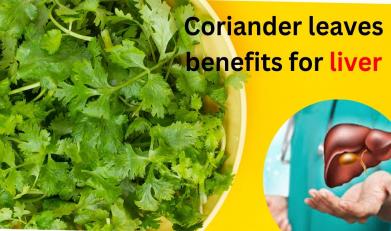

18 May, 2024
Coriander, also known as cilantro in some regions, is a versatile herb that not only adds a burst of flavor to dishes but also offers a myriad of health benefits. Among these, its potential benefits for liver health stand out, making it a valuable addition to a balanced diet. Here’s a closer look at how coriander leaves can support liver function and overall well-being.
1. Detoxification Powerhouse: The liver is the body’s main detoxification organ, responsible for filtering out toxins and waste products from the blood. Coriander leaves contain compounds that enhance the liver's ability to detoxify the body. They are rich in antioxidants such as quercetin, which help reduce oxidative stress and prevent liver damage caused by free radicals. This detoxification process is crucial for maintaining overall health and preventing liver diseases.
2. Anti-inflammatory Properties: Chronic inflammation is a common underlying factor in many liver diseases, including fatty liver disease and hepatitis. Coriander leaves are packed with anti-inflammatory compounds like cineole and linoleic acid. These substances help reduce inflammation in the liver, promoting better liver health and reducing the risk of liver-related complications.
3. Protection Against Fatty Liver: Fatty liver disease, characterized by the accumulation of fat in liver cells, can lead to more severe liver conditions if not managed properly. Coriander leaves have been shown to help regulate lipid levels in the blood. They aid in reducing bad cholesterol (LDL) and increasing good cholesterol (HDL), thereby preventing the buildup of fat in the liver and promoting a healthier lipid profile.
4. Rich Source of Nutrients: Coriander leaves are a nutrient-dense food, providing essential vitamins and minerals that support liver health. They are particularly high in vitamin K, which plays a crucial role in blood clotting and bone health, and vitamin A, which is important for immune function and maintaining healthy skin and mucous membranes. These nutrients contribute to the overall health of the liver and help it perform its functions efficiently.
5. Chelation of Heavy Metals: Heavy metal toxicity can severely impair liver function. Coriander leaves have natural chelation properties, meaning they can bind to heavy metals like lead, mercury, and arsenic, and help expel them from the body. This detoxifying effect protects the liver from the harmful effects of these metals and supports its role in maintaining a clean and toxin-free bloodstream.
6. Support for Digestive Health: A healthy digestive system is closely linked to liver health. Coriander leaves aid digestion by promoting the production of digestive enzymes and juices. This improves the overall efficiency of the digestive process, reducing the workload on the liver. Additionally, coriander can help alleviate bloating and discomfort, ensuring that the liver and other digestive organs function smoothly.
Coriander leaves are not just a culinary delight but also a potent ally for liver health. Their detoxifying, anti-inflammatory, and nutrient-rich properties make them an excellent choice for supporting liver function and overall well-being. By incorporating coriander leaves into your daily diet, you can take a proactive step towards maintaining a healthy liver and enjoying the numerous benefits this wonderful herb has to offer. So, next time you reach for that bunch of coriander, remember that you're not just enhancing the flavor of your meal – you're also nourishing your liver.